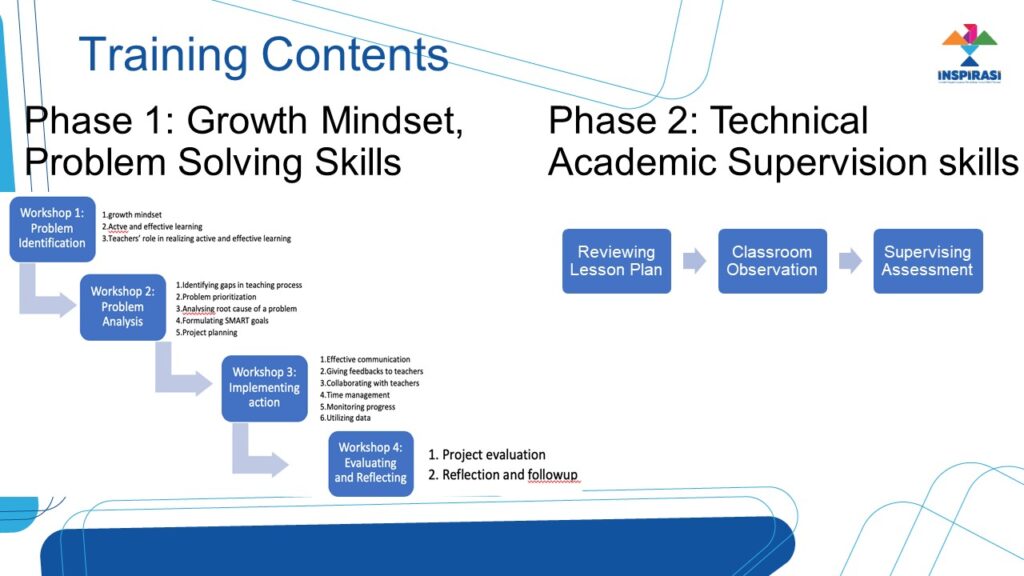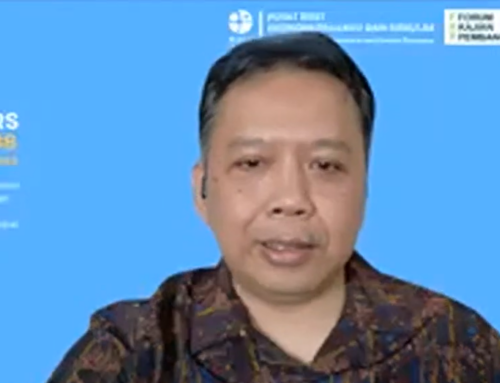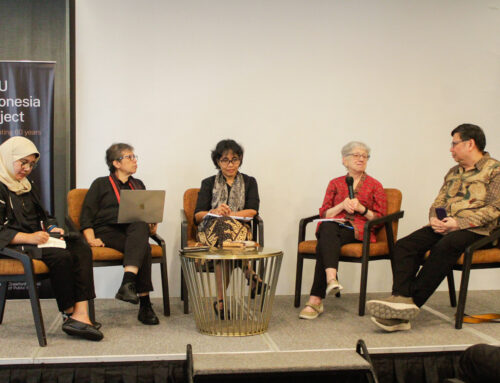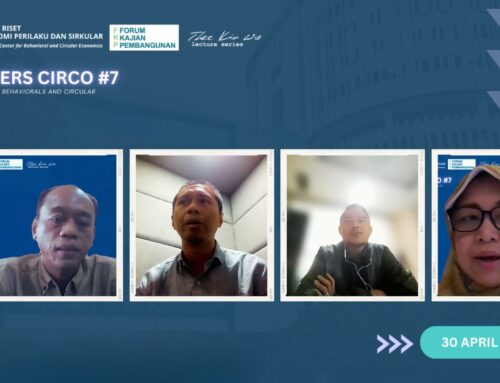FKP hosted by INSPIRASI Foundation with Patrya Pratama (INSPIRASI Foundation) and Cheryl Ann Fernando (PEMIMPIN – Global School Leaders/GSL Malaysia). Thursday, 23 July 2020.
KEYPOINTS:
- Despite many training programs for teachers and school principals, many fails to achieve the minimum level of competency as required by the law, and students’ learning outcomes in Indonesia are still low. Several rounds of training of teachers and principals by the INSPIRASI Foundation revealed that acquiring/improving soft skills enhance teacher and principals’ growth mindset which, in turn, is positively correlated with improvement in observed teaching practices. Improving soft skills and providing mentorship in solving school-specific problems could be the missing ingredient in teacher and principal training in Indonesia.
- The COVID-19 pandemic exacerbated the weaknesses in the education system – lack of teachers’ competence in information technology (IT) and the gap between poor and non-poor students made distance learning chaotic and ineffective and lead to learning loss. Measures need to be undertaken e.g. training of teachers in the use of technology; encouraging teachers to teach at the right level (the level at which they find their students irrespective of grade); and supporting school leaders in managing the students’ learning and general wellbeing.
SUMMARY
- INSPIRASI in Indonesia and PEMIMPIN in Malaysia conduct leadership training programs to improve the competency and teaching practices of principals and teachers. In Indonesia, INSPIRASI provides mentoring to 87 school principals, 15 supervisors, and 5 community working groups (K3S). In Malaysia, PEMIMPIN GSL works with 90 schools and 200 school leaders.
- In Indonesia, academic supervision and information technology (IT) are competencies that are least mastered by the principals compared to other skills such as managerial, entrepreneurial and personal/social skills. Combined with the situation where many teachers have not achieved the minimum teaching competency standard required by law, this results in in low overall teachers’ effectiveness score – a score of 2.5 out of the maximum 8 points amongst teachers working with INSPIRASI Foundation. However, despite the low overall teachers’ effectiveness score, principals are satisfied with their teachers’ performance. This indicate that principals do not know that the teaching in their school is not up to par.
- To address the lack in competency, principals were trained using a combination of workshop and school facilitation/mentoring method over 11 sessions (see the figure below). Phase 1 of the training started with program identification, and in this phase, principals are introduced to the growth mindset (the belief that a student’s intelligence can be improved through hard work) and problem-solving skills. Phase 2 then involved academic supervision skills such as reviewing teachers’ lesson plans, classroom observation, etc. Throughout the training, principals are provided with mentoring and assistance in solving the problems that they face in their schools.
- Several key insights were obtained through the training rounds. First, training in soft skills (e.g. how to provide feedback to teachers, how to resolve conflict between teachers) are more needed than technical skills. As teachers and principals improve their soft skills, they also improve their mindset. Principals improved their leadership mindset; teachers improve their growth mindset. Improvement in the growth mindset was found to be positively correlated with better teaching practices. On the other hand, technical skills (e.g. the frequency of academic supervision) is not correlated with better teaching practices. Government-led training for teachers and principals often focus on technical skills. The findings and experience of INSPIRASI indicate that training in soft skills may be what’s missing from these government-led trainings.
Second, the trainings by INSPIRASI are group-based and new groups are formed in the training workshops. It may be more efficient to use existing structures, e.g. the Principals Working Group (K3S) which up to now is more often used only to disseminate new government regulations. It is suggested that K3S is supported by a facilitator that provides mentoring to principals.
- Chery Ann Fernando (PEMIMPIN) focused her presentation on the impact of COVID-19 pandemic on schooling in Malaysia. The main problems encountered during the lockdown was many students from low-income families saw their parents lose their job during the lockdown, and this caused school leaders to be worried about their students’ well-being. Additionally, access to technology is not the same for every student; at least 37% of Malaysian students do not have access to data or device to use online learning materials. During the pandemic, this problem becomes more evident. Finally, similar to Indonesia, many teachers and school leaders are not adequately trained in using technology and, due to the centralized education system in Malaysia, many of them could only wait for instruction from the government.
- PEMIMPIN responded to these challenges by, first, reaching out to donors to support low-income students. Second, providing training to school leaders on on the use of Telegram or WhatsApp for teaching (chosen because of they require low data so are the least expensive option for accessing the internet). Finally, facilitating dialogue amongst teachers from all over Malaysia to share their struggles and, now, to discuss how to face the new normal.
- The COVID-19 pandemic has revealed the weaknesses in the education system both in Indonesia and Malaysia. Information technology is a key weakness in both countries, where school leaders have low competency in their use for teaching thereby creating chaos at the beginning of the pandemic as schools moved to distance learning mode. Low income students are of particular concern in both countries as they lack the resources to participate in online learning. In the long run, this will create a wider learning gap between students, and governments have not yet presented clear policies on how to close that gap.
- Learning loss is inevitable due to social distancing and restrictions which are expected to continue until infections are stopped or a vaccine is found. To cope, some suggestions are 1) teachers should teach at the right level, meaning that if students in grade 4 are still at grade 3 ability, then the teacher should teach at that level; 2) school leaders as community leaders need to be supported in their job, especially now as they face huge pressures not only in terms of facilitating students’ learning but also students’ overall well being.





